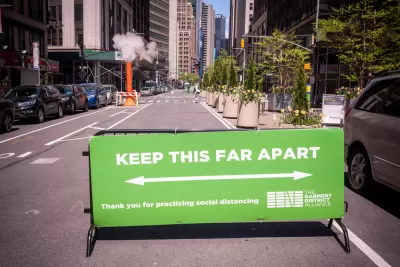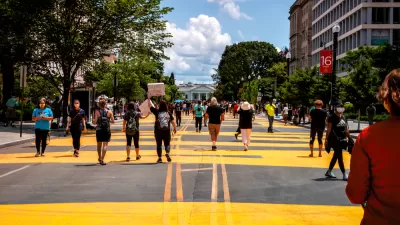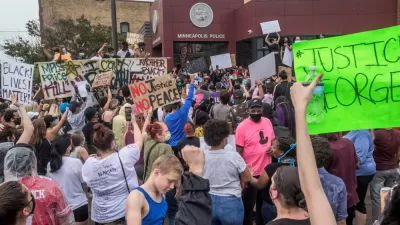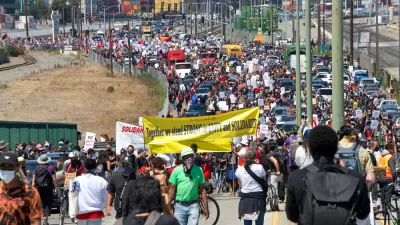The ongoing debate about the role of marginalized communities in the emergency planning programs of the pandemic has now been detailed on the pages of the New York Times.

An article by Emily Badger for The New York Times amplifies an ongoing debate about planning processes during the pandemic—emergency efforts to reshape the public realm to create more space for pedestrians and restaurant and retail businesses—failing the equity test of including marginalized and under-served communities.
The primary source for Badger's coverage of the debate is Destiny Thomas, whose writing on this subject was shared here on Planetizen in June, and who has also been a source in other articles raising the same issues.
Here's how Badger summarizes the debate:
Today, visions of urban life reinvented for the future are colliding with unaddressed inequalities from the past. And the urgency of a public health threat is pushing against demands for the long work of inclusion.
So the questions raised by the debate are questions about the fundamental processes and outcomes of planning: who gets to make the decisions about the future of cities and communities, and how are planners reckoning with the racist and discriminatory outcomes of previous generations of planning decisions?
As an example of the reforms proposed by Thomas, Badger includes the following:
Ms. Thomas, the anthropologist-planner, who leads a team of strategists called the Thrivance Group, says traditional public meetings aren’t her idea of engagement anyway. Instead, she suggests cities could fund community health clinics or food banks already serving these neighborhoods to engage residents on what they need from the city at the same time. City departments could also put community residents on staff to do this work. Ms. Lemar proposes using elementary schools to reach families who would never attend public meetings.
The article treats Oakland's slow streets specifically as a case study for the issues of representation and political power in planning during the pandemic, while raising the larger implications of those experiences for the practice of planning and community engagement for planners around the country by citing academics and advocates from around the country.
FULL STORY: The Pandemic Has Pushed Aside City Planning Rules. But to Whose Benefit?

Planetizen Federal Action Tracker
A weekly monitor of how Trump’s orders and actions are impacting planners and planning in America.

Restaurant Patios Were a Pandemic Win — Why Were They so Hard to Keep?
Social distancing requirements and changes in travel patterns prompted cities to pilot new uses for street and sidewalk space. Then it got complicated.

Map: Where Senate Republicans Want to Sell Your Public Lands
For public land advocates, the Senate Republicans’ proposal to sell millions of acres of public land in the West is “the biggest fight of their careers.”

Maui's Vacation Rental Debate Turns Ugly
Verbal attacks, misinformation campaigns and fistfights plague a high-stakes debate to convert thousands of vacation rentals into long-term housing.

San Francisco Suspends Traffic Calming Amidst Record Deaths
Citing “a challenging fiscal landscape,” the city will cease the program on the heels of 42 traffic deaths, including 24 pedestrians.

California Homeless Arrests, Citations Spike After Ruling
An investigation reveals that anti-homeless actions increased up to 500% after Grants Pass v. Johnson — even in cities claiming no policy change.
Urban Design for Planners 1: Software Tools
This six-course series explores essential urban design concepts using open source software and equips planners with the tools they need to participate fully in the urban design process.
Planning for Universal Design
Learn the tools for implementing Universal Design in planning regulations.
Heyer Gruel & Associates PA
JM Goldson LLC
Custer County Colorado
City of Camden Redevelopment Agency
City of Astoria
Transportation Research & Education Center (TREC) at Portland State University
Camden Redevelopment Agency
City of Claremont
Municipality of Princeton (NJ)





























